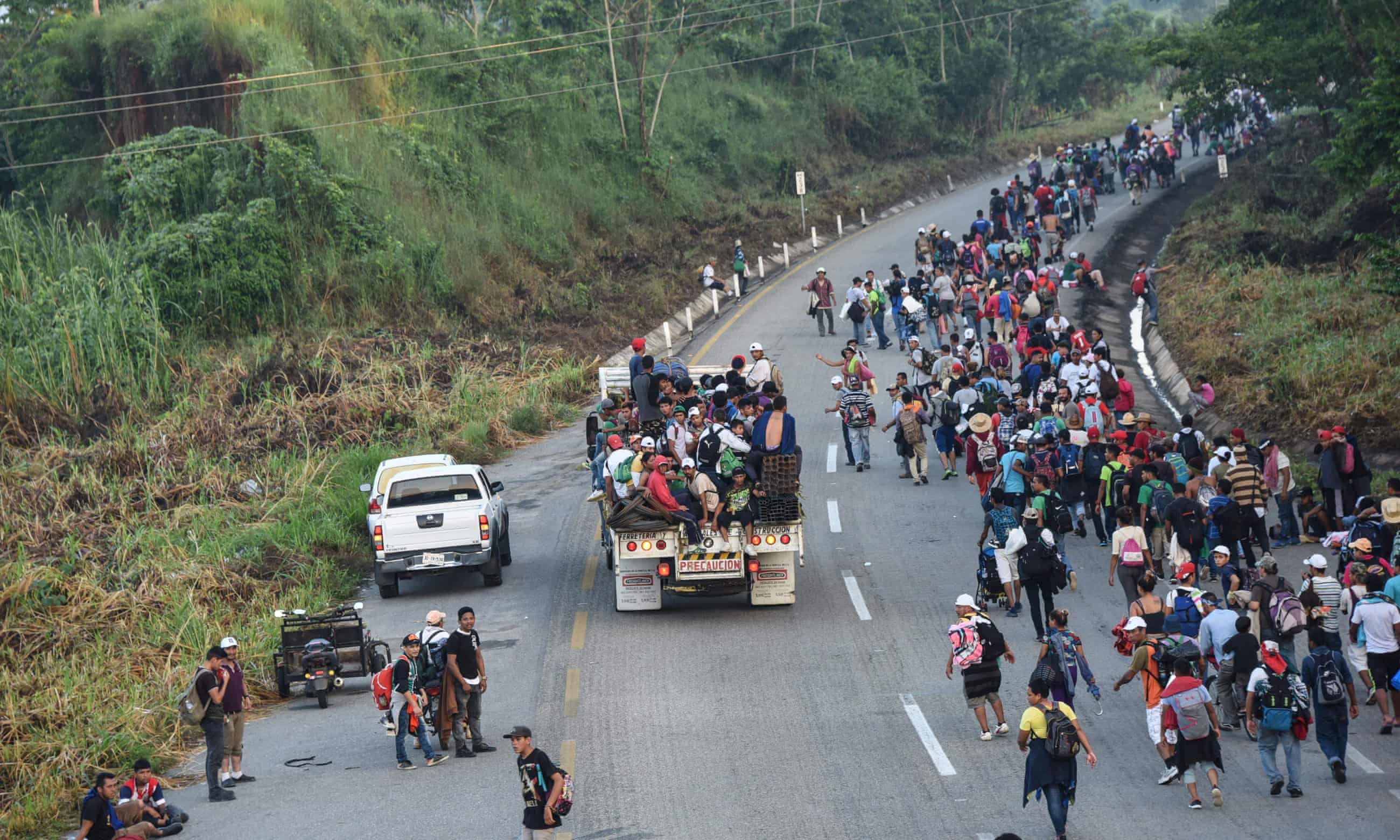|
The unseen driver behind the migrant caravan: climate change

Oliver Milman in New York, Emily Holden, and David Agren in Huixtla, Mexico
Honduran migrants taking part in a caravan heading to the US, walk alongside the road in Huixtla, Chiapas state, Mexico, on 24 October. Photograph: Johan Ordonez/AFP/Getty Images
Thousands of Central American migrants trudging through Mexico towards the US have regularly been described as either fleeing gang violence or extreme poverty. But another crucial driving factor behind the migrant caravan has been harder to grasp: climate change.
Most members of the migrant caravans come from Guatemala, Honduras and El Salvador – three countries devastated by violence, organised crime and systemic corruption, the roots of which can be traced back to the region’s cold war conflicts.
'God will decide if we make it': Central American caravan presses northward
Experts say that alongside those factors, climate change in the region is exacerbating – and sometimes causing – a miasma of other problems including crop failures and poverty.
And they warn that in the coming decades, it is likely to push millions more people north towards the US.
“The focus on violence is eclipsing the big picture – which is that people are saying they are moving because of some version of food insecurity,” said Robert Albro, a researcher at the Center for Latin American and Latino Studies at American University.
“The main reason people are moving is because they don’t have anything to eat. This has a strong link to climate change – we are seeing tremendous climate instability that is radically changing food security in the region.”
Migrants don’t often specifically mention “climate change” as a motivating factor for leaving because the concept is so abstract and long-term, Albro said. But people in the region who depend on small farms are painfully aware of changes to weather patterns that can ruin crops and decimate incomes.
Experts say that alongside those factors, climate change in the region is exacerbating – and sometimes causing – a miasma of other problems including crop failures and poverty.
And they warn that in the coming decades, it is likely to push millions more people north towards the US.
“The focus on violence is eclipsing the big picture – which is that people are saying they are moving because of some version of food insecurity,” said Robert Albro, a researcher at the Center for Latin American and Latino Studies at American University.
“The main reason people are moving is because they don’t have anything to eat. This has a strong link to climate change – we are seeing tremendous climate instability that is radically changing food security in the region.”
Migrants don’t often specifically mention “climate change” as a motivating factor for leaving because the concept is so abstract and long-term, Albro said. But people in the region who depend on small farms are painfully aware of changes to weather patterns that can ruin crops and decimate incomes.
Pausing for a rest as the first of the three recent migrant caravans passed through the Mexican town of Huixtla last week, Jesús Canan described how he used to sow maize and beans on a hectare of land near the ancient Copán ruins in western Honduras.
An indigenous Ch’orti’ Maya, Canan abandoned his lands this year after repeated crop failures – which he attributed to drought and changing weather patterns.
“It didn’t rain this year. Last year it didn’t rain,” he said softly. “My maize field didn’t produce a thing. With my expenses, everything we invested, we didn’t have any earnings. There was no harvest.”
Desperate and dreaming of the United States, Canan hit the road in early October and joined the migrant caravan. He left behind a wife and three children – ages 16, 14 and 11 – who were forced to abandon school because Canan couldn’t afford to pay for their supplies.
“It wasn’t the same before. This is forcing us to emigrate,” he said. “In past years, it rained on time. My plants produced, but there’s no longer any pattern to the weather.
|
Oliver Milman, Emily Holden, and David Agren, 30/10/2018
|
|
|
|
The Mary Initiative
A Bridge of Understanding
Operational, Safety, Security & First Aid Training for NGO's
|
|
|
|